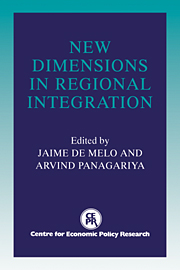Book contents
- Frontmatter
- Contents
- List of figures
- List of tables
- Preface
- Foreword
- Acknowledgements
- List of conference participants
- PART ONE SYSTEMIC ISSUES
- PART TWO COUNTRY ISSUES
- 6 The new regionalism: a country perspective
- Discussion
- 7 The European Community: a case of successful integration?
- Discussion
- 8 Regional integration in Sub-Saharan Africa: past experience and future prospects
- Discussion
- 9 Latin America's integration and the multilateral trading system
- Discussion
- 10 Regional integration in Eastern Europe: prospects for integration within the region and with the European Community
- Discussion
- 11 Regional trade arrangements in North America: CUSTA and NAFTA
- Discussion
- 12 Trading blocs and East Asia
- Discussion
- 13 Prospects for regional integration in the Middle East
- Discussion
- Round Table Discussion
- Index
Discussion
Published online by Cambridge University Press: 04 May 2010
- Frontmatter
- Contents
- List of figures
- List of tables
- Preface
- Foreword
- Acknowledgements
- List of conference participants
- PART ONE SYSTEMIC ISSUES
- PART TWO COUNTRY ISSUES
- 6 The new regionalism: a country perspective
- Discussion
- 7 The European Community: a case of successful integration?
- Discussion
- 8 Regional integration in Sub-Saharan Africa: past experience and future prospects
- Discussion
- 9 Latin America's integration and the multilateral trading system
- Discussion
- 10 Regional integration in Eastern Europe: prospects for integration within the region and with the European Community
- Discussion
- 11 Regional trade arrangements in North America: CUSTA and NAFTA
- Discussion
- 12 Trading blocs and East Asia
- Discussion
- 13 Prospects for regional integration in the Middle East
- Discussion
- Round Table Discussion
- Index
Summary
Chapter 13 is a brave study of an extremely difficult topic. I feel none of us would have had an easy time writing a paper on economic integration of a region in which non-economic concerns play such an important role. Indeed I felt that even an economist as capable and as seasoned as Fischer had a hard time of it. For instance, the first eight pages of the study is devoted to definitions. It is not until p. 426 that the author addresses the topic of the chapter directly. There he states, ‘there is no realistic prospect of Middle East-wide regional integration on either the NAFTA or EC models in the near future. More limited moves towards economic cooperation in the region can be envisaged’. I will focus most of my comments on this statement. I realise that politics is the greatest impetus for Middle East economic integration, so that much of my comment is tangential to the main purpose of the chapter. Nevertheless, since I am a trade economist who firmly believes in following comparative advantage, and I have no particular knowledge of Middle Eastern politics, I limit my comments to the economics of Middle Eastern economic integration.
I think no one would disagree with Fischer's basic conclusion that a Middle East-wide trade bloc is unlikely to form in the near future. In fact, I cannot even think what it would look like. I do, however, have a name for it: the Middle East Trade Opportunity Organisation, which would be known as ME-TOO.
- Type
- Chapter
- Information
- New Dimensions in Regional Integration , pp. 448 - 452Publisher: Cambridge University PressPrint publication year: 1993



